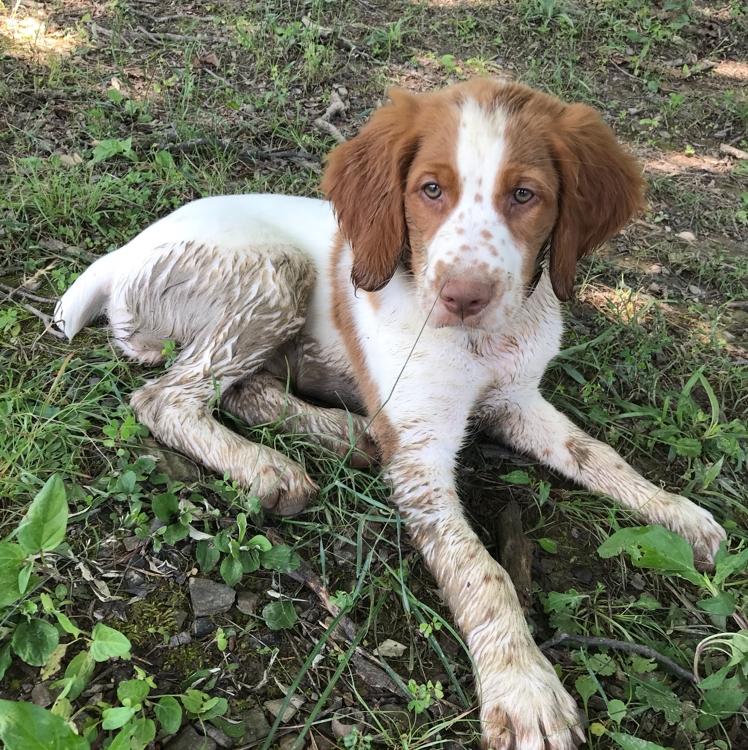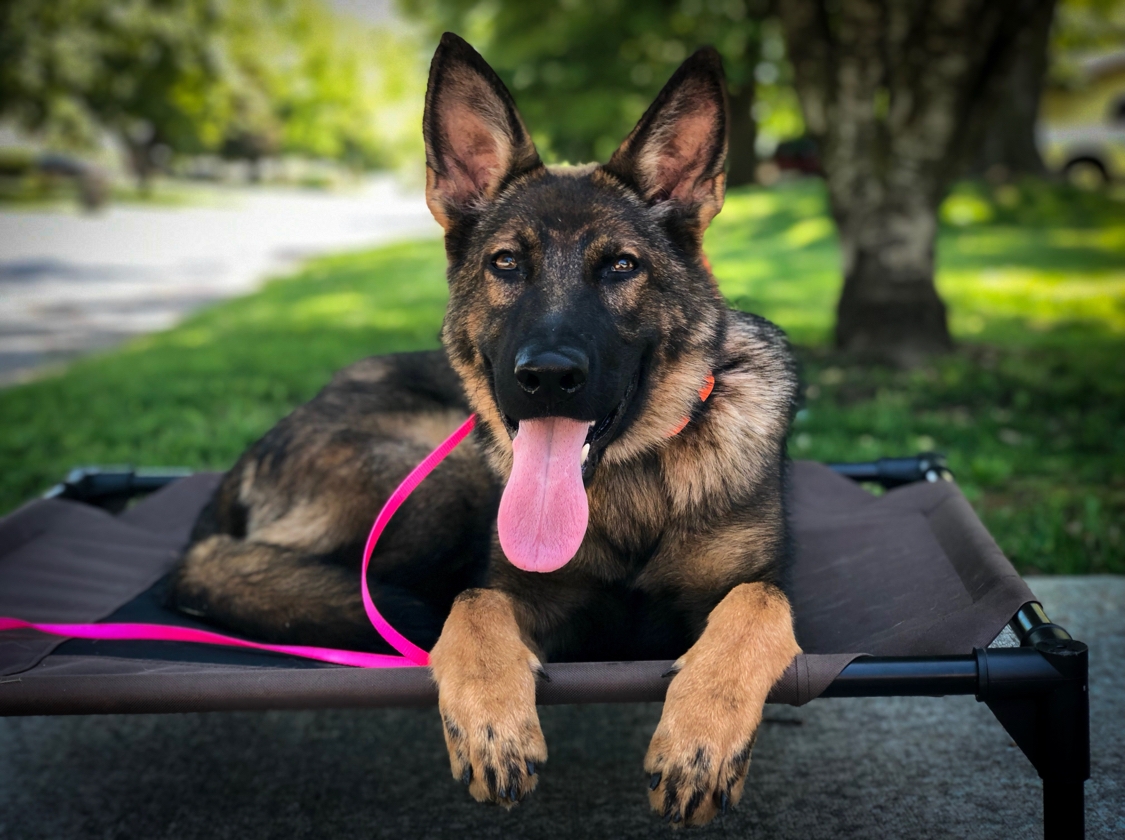How To Stop My Dog From Digging I The Garden
Whether you're a long-time home-owner or bringing your dog home to a lawn of your own for the very first time, sharing a green space with your best friend can feel like a dream come true. But when your dog is constantly digging holes in your hard-won grass carpet, letting Fido roam free in your piece of the great outdoors quickly turns into less of a dream and more of a lawn-care nightmare.
Dog-dug holes aren't only an eyesore, they can make your backyard a dangerous environment where a twisted ankle is always one false step away. Before you chalk your lawn up as a loss, try these steps to bring your outdoor space back to the beautiful yard you fell in love with before your dog got its paws in it.
1. Try Some Pet Psychology
Chances are, your dog has already identified their favorite spots to dig up dirt. You can use the location of these spots as a clue to understand why your dog is digging. The American Kennel Club points out that dogs dig for all kinds of reasons, including hunting, seeking shelter, boredom, or even trying to sneak away. You should address your dog's behavior by addressing the reason. Before you aim to put the kibosh on digging behaviors, watch the way your dog is digging. Do they seem frantic, manic, and stressed? Or is the digging strategic -- like there is some goal in mind?
If your dog is digging holes that are close to the edges of your property or another boundary, like a fence, it's possible they're curious about what lies beyond the lawn -- and are trying to engineer a prison-break.
If the holes that appear seem to be close together, near a main open area or at the roots of your shrubs, your dog may be hunting down intruding animals (like field mice, raccoons, or possums). This is even more likely if your dog is a hunting breed, like a labrador, retriever, or beagle.
Holes that are located near the foundation of your home, around the borders of your deck, or in shady areas may indicate that your dog is just seeking out comfort. Digging to create a cool or sheltered area to lay down in isn't your dog behaving badly as much as it is a natural response for any animal.
Of course, there's also times that your dog is simply digging holes to pass the time, to let off steam, or even as a way to get attention. Maybe your dog recently saw you doing some yard work and wants to get in on the "fun". Or maybe you have a high-energy breed of dog, or a puppy that is trying to tell you that they aren't getting quite enough exercise.

2. Do Some Digging of Your Own
This may seem counterintuitive, but a big part of solving the problem of your dog digging up your lawn might center around picking up your own garden shovel.
First, identify a spot that will be your dog's go-to digging spot. This should be different than the designated spot you have for your pet to relieve themselves. If your lawn is big enough, put your pet's new burrowing hub at the opposite end of your yard from the places that are currently being uprooted regularly, so that those areas can be overseeded and repaired. You might even try a child-size sandbox.
Wherever you decide to put your "digging zone", let your fluffy friend know that this small space is their own digging paradise by burying incentives, like chew toys and rawhides, 2-3 inches below the ground.
Next, you'll need to cover dug-up areas with top soil. While you're doing so, bury known doggy-digging deterrents, like plastic chicken wire, about six inches below the surface of the soil. Don't use metal or any other material that could hurt your dog's paws permanently. Covering favorite digging spots with flat rocks temporarily is another deterrent.
Finally, take a thorough walk through your lawn to uncover and dispose of any dog feces that may be lurking in spots you've missed. Dog poop draws vermin to your lawn, even if they only come out at night. The leftover scents of these nocturnal lurkers might be driving your dog to dig. Rinse the areas where you've picked up dog feces with a firm spritz or two from your garden hose.
.jpg%3Fv%3D0&c_options=)
3. Supervise Your Dog Outside
You want your dog to stop digging up your lawn. And your dog may even be aware of that! But without direct, consistent guidance from their favorite person -- you! -- they won't even be able to quit their digging habit.
If your dog digs because they are seeking comfort or shelter, you can eliminate their need to do that. Give your dog access to an outdoor doggie-hammock and put it in a shady space. Limit your dog's unsupervised time outside, at least during the period you're focused on correcting their behavior. Make sure they have access to fresh water whenever they are on the lawn.
Note that filling your dog's holes in with water for them to drink or punishing your dog when they dig isn't helpful. You need to take a firm stance to help correct your dog's behavior, but making them drink muddy water, isolating them, or putting them in a "time out" will probably just confuse your pup and might even add stress to your relationship, which could make digging worse.
When your dog starts to go to town on his or her favorite digging spots, give them a firm "no." If you've set up a digging zone, lead them to it whenever digging begins. Praise your dog warmly and offer treats or rewards when they stop digging and when they dig in the right place. They'll get the message loud and clear.

4. Give Your Dog More Exercise And Attention
For many high-energy breeds of dog, the answer to the problem of holes in your lawn is a serious increase in attention, supervision, and fun activities for your dog. It's irritating to have a dog that's always creating holes in your beautiful outdoor space, but your dog can't stop their urge to dig any more than you can stop wishing they'd quit digging.
Most importantly, try to increase the amount of activity and attention that your dog is getting each and every day. If "letting the dog out" has become a convenient replacement for your dog's daily walks, your pet might be feeling neglected. Spend time together outside of your lawn, and add brisk exercise (like fetching and frisbee) to the list of experiences you're giving your dog on a regular basis.
If you have a high-energy breed, like a shepherd, a collie, or a terrier, a higher degree of energy-intervention might be required. Giving your dog puzzles to solve indoors and allowing them time to actually run and jump around at full speed might be the only things that help to quiet their minds. The more positive attention you are giving your dog, the easier it will be to train them. Again, negative attention, like yelling and punishment, isn't going to correct this behavior.
.jpg%3Fv%3D0&c_options=)
But What If Nothing Works?
What if all else fails and your canine companion never stops digging? Or what if he does stop digging, but your damaged lawn still looks like it could use an upgrade? Never you fear. Regardless of how enthusiastic or aggressive Fido is in his use of your shared green space, BarkYard™ can help make things better.
By incorporating Good Boy™ and Bad Spot!™ products into your lawn maintenance routine, dog-loving lawn owners like you can preserve their peace of mind. Overseeding and fertilizing your lawn after you've worked to correct your dog's behavior will give your green space an instant facelift. One particularly effective strategy is to regularly use Bad Spot!™ while you fill in holes with loose topsoil. Even if your dog takes some time to stop digging, continuous maintenance of your lawn with Good Boy™ and Bad Spot!™ will pay off as you signal to your pupper that the lawn isn't an escape room built for them to figure out -- it's a family getaway.
How To Stop My Dog From Digging I The Garden
Source: https://www.getbarkyard.com/blogs/how-to/how-to-stop-your-dog-from-digging-up-your-lawn
Posted by: thomasthadvating.blogspot.com

0 Response to "How To Stop My Dog From Digging I The Garden"
Post a Comment